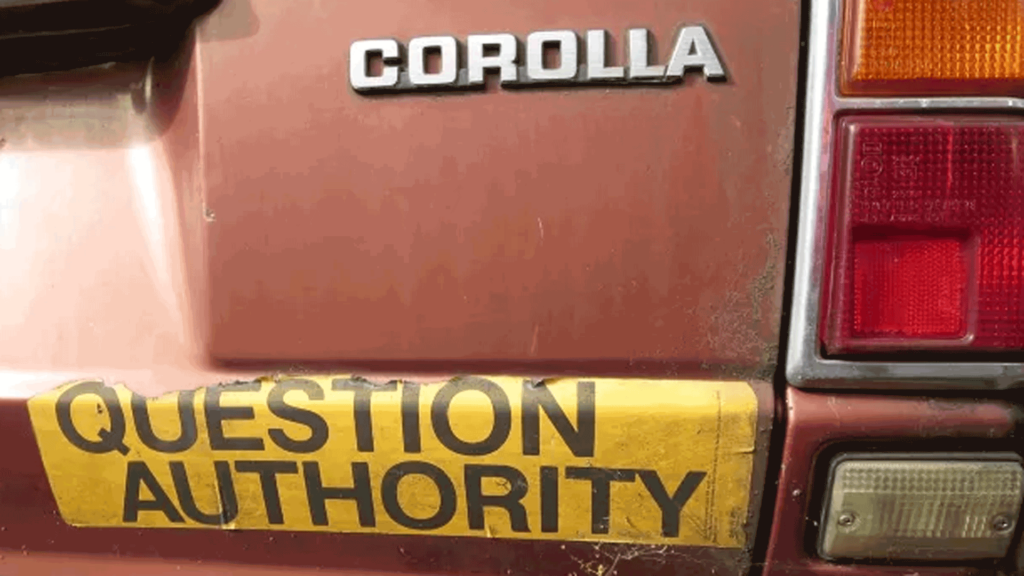“Do not be scared by the word authority. Believing things on authority only means believing them because you have been told them by someone you think trustworthy. I believe there is such a place as New York. I have not seen it myself. I could not prove by abstract reasoning that there must be such a place. I believe it because reliable people have told me so. … Every historical statement in the world is believed on authority.”
C.S. Lewis in Mere Christianity
The most interesting feature of the recent COVID pandemic was the battle between authorities to win the hearts and minds of the public. Medical advice and public policy strategies were all built around whose theories were endorsed by officialdom and whose were cast aside. Many of the assumptions at the beginning of the pandemic about modes of transmission and methods of prevention turned out to be wrong, but they were based on previous experience and what were assumed to be similar pathogens.

Social distancing turned out to be a good strategy, whereas all but the highest quality masks proved largely ineffective. Vaccines markedly reduced the risks for older people, but the risk/reward calculations for younger people are still not well understood.
Social media allowed each of us to educate ourselves about what was known and not known, and to choose which authority’s theories and advice we would follow. Some of those authorities gave terrible advice. Two examples: some people who might have survived died because they rejected vaccination out of the belief that the cure was worse than the disease; some elderly residents in retirement centers were kept out of hospitals by wrong-headed quarantine rules and died because of the lack of high-level medical care.
In every case, actions were taken because someone in authority persuaded government officials or ordinary citizens that X was true and Y was false. In many cases those authorities saved lives, but there was a lot of damage caused by bad advice. The nation and its leaders were in an unprecedented panic; neither science nor government work well under that kind of pressure.
The pandemic raised a larger question: how do we think about authority in the year 2023? Postmodernism has ushered in a post-truth age where the only real authority—especially as it concerns questions of morality, identity, purpose, and meaning—is a voice that speaks from somewhere inside of me. My truth supersedes authoritative Truth. COVID was just one example of how the “my truth” framework has pushed its way even into the realm of the hard sciences.
Which is why, almost overnight, we have discovered that sexual identity is not binary but fluid, and why political identity and the ever-shifting set of causes that define modern citizen’s sense of morality have become our life foundations, rather than, for example, historical statements embraced by previous generations such as the Ten Commandments or the Declaration of Independence.
We no longer believe in an eternal Authority and have grown distrustful of systems and powers that want to exert control or influence over our lives. We’ve grown to believe that the law is systematically biased away from justice, that government is in the pocket of big business, that authority of all types is merely aimed at maintaining the status quo of the cis-normal and the patriarchy.
So more and more are embracing a new order of anti-authority. Antifa prefers anarchy to order and people-power to the state. (One of Antifa’s many slogans is: “Fight all governments. There’s no authority but yourself.“) Climate activists have created non-governmental coalitions to pressure businesses and states (and scientists) to adopt faster and more radical plans to reverse the damage done to the earth by humanity. And ultimately, as a general trend, we see people looking more and more to both populist movements and the impulses of their own hearts as the source of personal authority.
If we set ourselves up as our own highest authority, there will be no peace. We will each battle for the supremacy of our own interests and those of our tribe and, convinced of the rightness of our cause, we will push aside any who stand in our way—while patting ourselves on the back for doing so. This is the moral philosophy that has guided every one of history’s despots.
The authority of the Christian God is an authority rooted in Truth, true justice, boundless goodness, race-blind brotherhood, and lasting peace. May we humble ourselves and relinquish the reins of our lives to the Prince of Peace, Jesus.




Comment Policy: All comments are subject to moderation. Your words are your own, but AnotherThink is mine, so I reserve the right to censor language that is uncouth or derogatory. No anonymous comments will be published, but if you include your real name and email address (kept private), you can say pretty much whatever is on your mind. I look forward to hearing from you.